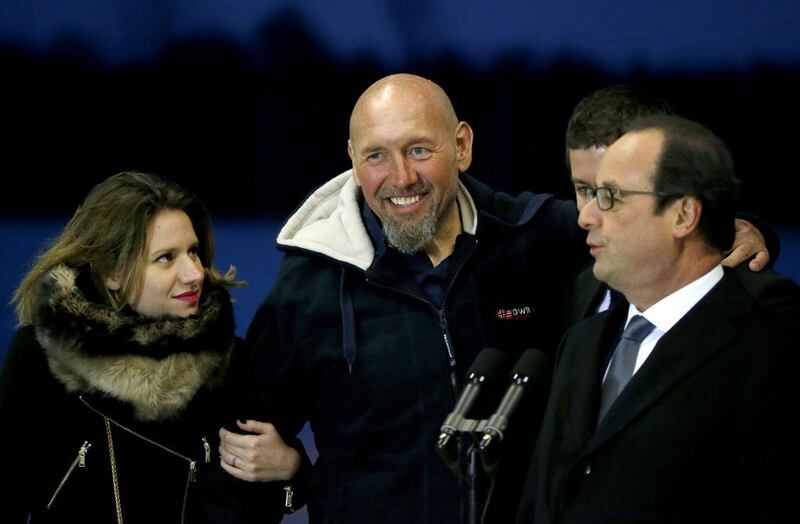NEW YORK // When Frenchman Serge Lazarevic was released by Al Qaeda’s North Africa affiliate after more than three years of captivity, the terms of his freedom were not revealed.
Yet, it was widely reported that he was exchanged last week for two militants who had been jailed in Mali.
French president Francois Holland boasted that France had no more hostages anywhere in the world.
While most countries deny paying ransoms, especially to extremist groups, France reportedly leads the way among European and Gulf states who secretly negotiate for kidnapped citizens and who have become reluctant funders of the militants.
“The problem we have is that this is a growing problem, there are obligations out there, but clearly if this kind of money is getting through to these groups in recent years there are people who are not observing these obligations,” Alexander Evans, coordinator for the United Nations’s Al Qaeda and Taliban monitoring group.
“Trying to change practice on this is harder than just pointing out that it is a significant problem and that it is a breach of sanctions to pay it.”
According to a New York Times investigation, France has provided US$58 million (Dh213m) in ransom payments, more than any other country. Qatar and Oman together come in second, according to the report.
Ransom payments are an important stream of revenue for militants, and the UN estimates that Al Qaeda in the Islamic Maghreb (AQIM) has received $75 million over the past four years — an average of $5.4 million per hostage was paid in 2012 — while ISIL has made up to $45 million from hostages in the past year alone.
“The more money a group has the more it can facilitate the infrastructure and space it can operate in,” said Mr Evans.
Ending the payment of these ransoms has become a priority for the US-led coalition against ISIL, part of an effort to crackdown on its finances. Yet, UN Security Council resolutions over paying ransoms remain largely unenforced as key allies have not ended their unofficial policies of negotiating with militants.
Only the US and Britain have strict no-negotiation policies that are followed.
The recent murders of US and British hostages, and three botched US special forces missions to free some of them, have raised questions about the US policy as well, and underlined the slim chances of survival for hostages from these countries.
But US officials insist their policy makes their citizens less likely targets and that the inconsistency among allies increases the risks for all westerners, who bring in the largest ransoms and serve as powerful propaganda for ISIL.
“Refusing to pay ransoms or to accede to other terrorist demands is the surest way to convince potential hostage-takers that they will not be rewarded for their crime...” David Cohen, the undersecretary for terrorism and financial intelligence at the Treasury Department, said in March.
“Although this may appear to be cold-hearted and is often agonisingly difficult to sustain in practice, plain logic and long experience demonstrate that this policy has led to fewer Americans being taken hostage”
People from countries where the militants operate make up the largest proportion of kidnap cases, though they garner less international attention.
UN officials have urged member states to enforce the many resolutions prohibiting payment to sanctioned groups, but as the release of Mr Lazarevic shows, they continue.
Part of the difficulty in convincing countries to end paying ransoms is the potential for negative domestic political fallout that governments might receive if they were known to have prevented a family from paying a ransom.
The international politics involved in the US pursuing a charge of Security Council violations against a fellow permanent member, such as France, would prove even difficult.
Other US allies who have allegedly paid ransoms have different motivations. Qatar has reportedly paid for the release of a number of western and Arab captives held by Jabhat Al Nusra, Al Qaeda’s affiliate in Syria.
“Qatar likes to be a deal maker, someone who can talk to all sides of a conflict,” said Daveed Gartentstein-Ross, a terrorism analyst at the Foundation for the Defense of Democracies think tank in Washington.
Qatar’s critics say the ransom payments are a way for it to reinforce ties to the militants.
European governments are also able to operate without running afoul of US sanctions and UN resolutions by using local middle men or spies to handle the negotiations and deliver the cash.
Some countries have reportedly hidden the payments by including the sums in overseas development budgets.
The market for kidnapping and ransom insurance doubled between 2006 and 2011 to $500 million, according to the Economist magazine.
The companies who provide insurance for visitors to high risk areas sometimes include clauses prohibiting payments to sanctioned groups, but some do not.
“Employing such a clause is not standard practice for all kidnap and ransom insurers, however, and one insurer [said] that it had lost business to competitors not using such a clause,” stated a UN report released in October.
Kidnappings for ransom in the Middle East have increased to 17 per cent of the world’s total, up from 4 per cent a decade ago, according to a report by Control Risks, a commercial risk analysis firm.
tkhan@thenational.ae





